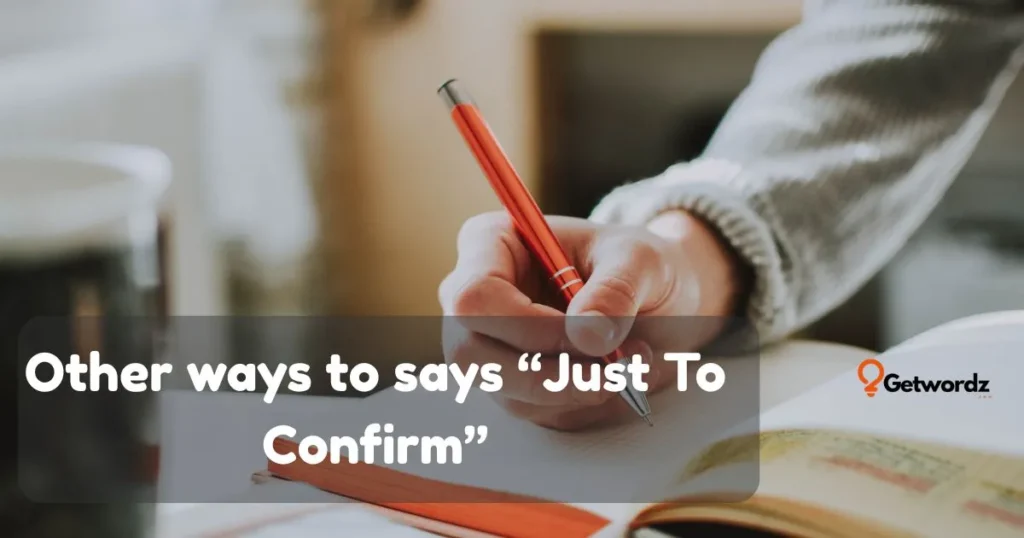“Just to Confirm” , a phrase we all use when double-checking plans, clarifying details, or making sure nothing slips through the cracks.
Whether it’s an email to your boss, a message to a client, or a quick text to a friend, it’s the go-to line for clear communication. But let’s be honest , saying “just to confirm” every time can start to sound repetitive, robotic, or overly formal.
If you’ve ever wondered how to sound more natural, friendly, or confident in your messages, you’re in the right place.
Many people search for different ways to say “just to confirm” because they want to add personality and warmth to their conversations , without losing clarity. The truth is, a few creative alternatives can make your message sound polished, engaging, and more human.
In this post, I’ll share fresh, meaningful, and versatile expressions you can use instead of “just to confirm” , perfect for emails, texts, and everyday interactions with friends, colleagues, family, or clients.
Each alternative comes with a tone that fits your intent, whether you want to sound professional, polite, or playful.
Ready to elevate your communication and find out which phrases say more than “just to confirm”? Let’s jump right in!
1. Just Making Sure
Scenario: You’re about to send a reminder to your coworker about tomorrow’s meeting. You don’t want to sound too formal, but you still want to confirm that everything’s set.
Explanation: “Just making sure” is a casual, friendly alternative to Just to Confirm. It’s perfect when you want to double-check something without sounding robotic. This phrase works great in both text messages and informal emails.
Examples:
- “Hey, just making sure you got my last email about the meeting?”
- “Just making sure we’re still good for dinner tonight.”
- “Just making sure you meant the blue one, right?”
Why It Works: This phrase feels warm, natural, and conversational. It helps you confirm details while keeping the tone light and approachable , ideal for coworkers, friends, or family.
2. Wanted to Double-Check
Scenario: You’re reviewing project details with your team and want to ensure everyone’s aligned before the deadline.
Explanation: “Wanted to double-check” sounds thoughtful and professional. It’s one of the best ways to say Just to Confirm in work-related conversations, showing that you’re responsible and detail-oriented.
Examples:
- “Just wanted to double-check if the final version was uploaded.”
- “I wanted to double-check the address before sending it out.”
- “Hey, I wanted to double-check , is this the latest file?”
Why It Works: It shows attentiveness and professionalism. Instead of repeating “Just to confirm,” this wording adds sincerity and reliability to your tone.
3. Can You Please Verify
Scenario: You’re emailing a vendor or client and need to confirm information in a polite, formal way.
Explanation: “Can you please verify” is a respectful, business-friendly alternative to Just to Confirm. It’s ideal for official emails or client communications where accuracy matters.
Examples:
- “Can you please verify if the payment has been received?”
- “Can you please verify the delivery date once more?”
- “Can you please verify that this document is the final version?”
Why It Works: This phrase balances professionalism with courtesy. It sounds confident and respectful, making it perfect for customer service, office correspondence, or formal discussions.
4. Just Wanted to Clarify
Scenario: You’re following up after a meeting and want to ensure everyone understood your earlier message.
Explanation: “Just wanted to clarify” works beautifully when you need to restate or confirm details. It’s a creative alternative to Just to Confirm that helps prevent confusion without sounding repetitive.
Examples:
- “Just wanted to clarify if we’re meeting in person or online.”
- “Just wanted to clarify the due date , is it next Friday?”
- “Just wanted to clarify one small point from our call.”
Why It Works: It feels thoughtful and proactive. Using this phrase shows that you value clear communication and teamwork.
5. Making Sure We’re on the Same Page
Scenario: You’re in a group chat finalizing travel plans and want to ensure everyone agrees on the time and place.
Explanation: This is a warm, inclusive alternative to Just to Confirm. It sounds collaborative and shows you care about mutual understanding.
Examples:
- “Making sure we’re on the same page about tomorrow’s flight time.”
- “Just making sure we’re on the same page before I book.”
- “Making sure we’re on the same page regarding the client feedback.”
Why It Works: It emphasizes teamwork and alignment. People feel more respected and involved when you use this expression.
Read more: 30 Other Ways To Say “Handsome” With Examples! 2025
6. Wanted to Make Sure
Scenario: You’re texting your friend about weekend plans and don’t want to sound too formal.
Explanation: “Wanted to make sure” is a simple, flexible phrase that fits almost any situation , casual or professional. It’s one of the most natural alternatives to Just to Confirm.
Examples:
- “Hey, wanted to make sure you’re still coming tonight.”
- “I wanted to make sure I have your correct address.”
- “Just wanted to make sure we’re meeting at 2, right?”
Why It Works: It’s short, sincere, and versatile. You can use it anywhere , in business emails or everyday messages.
7. Could You Confirm
Scenario: You’re writing a polite, concise email to a client asking for final approval.
Explanation: “Could you confirm” is direct yet courteous. It’s one of the best professional alternatives to Just to Confirm , perfect for emails where tone matters.
Examples:
- “Could you confirm the meeting time works for you?”
- “Could you confirm if this layout matches your request?”
- “Could you confirm that this is the correct invoice?”
Why It Works: It sounds polished and efficient. This phrase helps you maintain professionalism while keeping your request clear.
8. Wanted to Ensure
Scenario: You’re sending an update to your manager and want to make sure everything aligns with expectations.
Explanation: “Wanted to ensure” sounds confident and professional. It’s a refined alternative to Just to Confirm often used in corporate communication or client updates.
Examples:
- “I wanted to ensure all requirements were met before submission.”
- “I want to ensure the timeline still works for your team.”
- “Just wanted to ensure there were no last-minute changes.”
Why It Works: It communicates responsibility and diligence. This phrasing reinforces your reliability and professionalism.
9. Checking In to Confirm
Scenario: You’re following up after not hearing back about an event or meeting time.
Explanation: “Checking in to confirm” blends politeness with purpose. It’s a friendly alternative to “Just to Confirm,” showing initiative while keeping the tone gentle.
Examples:
- “Just checking in to confirm if you received my earlier message.”
- “Checking in to confirm our call for tomorrow.”
- “Checking in to confirm whether you’re joining us tonight.”
Why It Works: It’s approachable, polite, and works across personal and professional settings. You sound proactive without being pushy.
10. Making Sure Everything’s Set
Scenario: You’re planning a surprise party and want to ensure all the details are in order.
Explanation: “Making sure everything’s set” is a relaxed, conversational expression — one of the best informal alternatives to Just to Confirm.
Examples:
- “Just making sure everything’s set for tomorrow’s event!”
- “Making sure everything’s set with the decorations and food.”
- “I wanted to make sure everything’s set before the guests arrive.”
Why It Works: It’s upbeat, friendly, and easy to relate to. Perfect for messages where you want to sound organized yet laid-back.
Read more: 30 Other Ways To Say “Peace of Mind” With Examples! 2025
11. Just Wanted to Check
Scenario: You’re messaging your coworker to see if they finished a shared task. You don’t want to sound pushy, just politely curious.
Explanation: “Just wanted to check” is a warm, neutral way to follow up or confirm something. It’s one of the most common and natural alternatives to Just to Confirm, perfect for quick updates or reminders.
Examples:
- “Just wanted to check if you had a chance to review the file.”
- “Just wanted to check whether you’re still available later.”
- “Just wanted to check if my email came through okay.”
Why It Works: It’s polite without pressure. This phrase shows attentiveness while keeping your tone relaxed and professional.
12. Can You Let Me Know
Scenario: You’re texting your friend to confirm who’s bringing snacks to the party.
Explanation: “Can you let me know” is casual, clear, and conversational. It’s a great friendly alternative to Just to Confirm when you’re asking someone for an update or clarification.
Examples:
- “Can you let me know if you’re still coming tonight?”
- “Can you let me know when you’ll be free to talk?”
- “Can you let me know if this address is right?”
Why It Works: It feels easygoing yet direct. People respond well because it invites conversation rather than sounding like a demand.
13. Just Following Up
Scenario: You sent an email earlier and haven’t heard back, so you’re politely reaching out again.
Explanation: “Just following up” is a professional, polite way to re-engage communication. It’s among the best email alternatives to Just to Confirm because it keeps your tone respectful and proactive.
Examples:
- “Just following up to confirm if you received my proposal.”
- “Just following up to check if the schedule still works.”
- “Just following up in case my last message got missed.”
Why It Works: It’s courteous and professional. This phrase keeps your message friendly while reminding others to respond.
14. Wanted to Touch Base
Scenario: You’re checking in with a teammate about progress on a joint project.
Explanation: “Wanted to touch base” is a friendly, business-casual alternative to “Just to Confirm.” It works perfectly in workplace communication and networking.
Examples:
- “I wanted to touch base before the meeting tomorrow.”
- “Just wanted to touch base on the client’s feedback.”
- “I wanted to touch base and make sure everything’s on track.”
Why It Works: It sounds professional yet personal. It conveys teamwork and helps maintain smooth collaboration.
15. Wanted to Reconfirm
Scenario: You’ve already discussed details before, but want to ensure nothing has changed.
Explanation: “Wanted to reconfirm” is a polite, slightly formal alternative to Just to Confirm that shows careful attention to accuracy.
Examples:
- “I wanted to reconfirm our meeting time for tomorrow.”
- “I just wanted to confirm that the event starts at 6 p.m.”
- “I wanted to reconfirm the delivery date with your team.”
Why It Works: It demonstrates professionalism and responsibility. This phrase reassures others that you value precision.
Read more: 30 Other Ways To Say “Please Find Attached” Examples! 2025
16. Just Checking
Scenario: You’re sending a friendly reminder to a friend who tends to forget plans.
Explanation: “Just checking” is short, light, and perfect for informal communication. It’s one of the most casual alternatives to Just to Confirm that fits text messages or DMs perfectly.
Examples:
- “Hey, just checking if you’re still in for tonight.”
- “Just checking if you made it home safely.”
- “Just checking , are we still good for lunch?”
Why It Works: It feels kind and natural. You can use it in nearly any casual context without sounding overly formal or repetitive.
17. Wanted to See If
Scenario: You’re casually confirming if your classmate finished their part of a group project.
Explanation: “Wanted to see if” is conversational and soft. It’s a gentle alternative to Just to Confirm that helps you sound approachable while checking in.
Examples:
- “I wanted to see if you had time to review my draft.”
- “Wanted to see if we’re still on schedule.”
- “Just wanted to see if you received my text.”
Why It Works: It’s relaxed, flexible, and easy to use in any message. It keeps your tone curious rather than demanding.
18. Could You Please Confirm
Scenario: You’re finalizing a booking or client agreement and want polite confirmation.
Explanation: “Could you please confirm” is a classic, professional phrase that’s slightly more formal than “Could you confirm.” It’s one of the best email-ready alternatives to Just to Confirm.
Examples:
- “Could you please confirm your availability for the call?”
- “Could you please confirm that the payment was processed?”
- “Could you please confirm if the file was received?”
Why It Works: It’s polite, respectful, and adaptable to any professional context. It conveys professionalism and courtesy together.
19. Wanted to Follow Up On
Scenario: You’re emailing your manager to revisit a topic discussed earlier.
Explanation: “Wanted to follow up on” is a thoughtful, direct phrase — one of the most professional alternatives to Just to Confirm for ongoing communication.
Examples:
- “I wanted to follow up on the status of our last request.”
- “I wanted to follow up on the meeting notes.”
- “Just wanted to follow up on the invoice we discussed.”
Why It Works: It’s polished and intentional. You show initiative and responsibility without being repetitive.
20. Just Touching Base
Scenario: You’re checking in with a colleague after a week of no updates on a shared project.
Explanation: “Just touching base” is friendly, conversational, and often used in professional communication. It’s a modern alternative to Just to Confirm that builds rapport.
Examples:
- “Just touching base to confirm our meeting details.”
- “Just touching base to see if there are any updates.”
- “Just touching base before sending the final draft.”
Why It Works: It strikes a perfect tone , polite yet personal. It helps keep communication consistent and friendly.
Read more: 30 Other Ways To Say “Happy To See You” With Examples! 2025
21. I Wanted to Confirm
Scenario: You’re clarifying details in a professional email to avoid misunderstandings.
Explanation: “I wanted to confirm” is a direct yet courteous alternative that fits formal or semi-formal contexts. It’s among the most straightforward replacements for Just to Confirm.
Examples:
- “I wanted to confirm your attendance for the event.”
- “I wanted to confirm that you received my message.”
- “I wanted to confirm the delivery address before shipping.”
Why It Works: It’s clear, respectful, and efficient. The phrasing feels confident without sounding demanding.
22. Wanted to Be Sure
Scenario: You’re texting your partner to make sure they’re okay with a plan change.
Explanation: “Wanted to be sure” is gentle and thoughtful. It’s a casual alternative to Just to Confirm that adds a caring tone.
Examples:
- “I wanted to be sure you were fine with rescheduling.”
- “I wanted to be sure this color works for you.”
- “I wanted to be sure we’re still meeting later.”
Why It Works: It feels personal and considerate. The phrase makes your message sound genuine rather than procedural.
23. Wanted to Check In
Scenario: You’re sending a friendly follow-up to your client after a recent meeting.
Explanation: “Wanted to check in” is approachable and versatile. It’s one of the best human-sounding alternatives to Just to Confirm used in business and casual chats.
Examples:
- “Wanted to check in and confirm if you need any support.”
- “Just wanted to check in on how things are going.”
- “Wanted to check in and make sure everything’s on track.
Why It Works: It conveys care and professionalism at once. You come across as engaged and helpful, not repetitive.
24. Wanted to Verify
Scenario: You’re handling logistics or documents and need factual accuracy.
Explanation: “Wanted to verify” is a formal, detail-oriented alternative to Just to Confirm. It shows that you’re being thorough and responsible.
Examples:
- “Wanted to verify that all details match the contract.”
- “Wanted to verify your mailing address before dispatch.”
- “Just wanted to verify if the numbers are correct.”
Why It Works: It sounds precise and credible. This phrase works best in corporate, legal, or administrative settings.
25. Just Wanted to Recheck
Scenario: You’ve already confirmed something once but want to ensure nothing changed last minute.
Explanation: “Just wanted to recheck” is a soft, informal way to express double-checking. It’s an everyday alternative to Just to Confirm perfect for casual follow-ups.
Examples:
- “Just wanted to recheck if you’re bringing your laptop.”
- “Just wanted to recheck the timing before I leave.”
- “Just wanted to recheck we’re meeting at the same café.”
Why It Works: It’s easygoing and friendly. This phrase keeps things light while showing attention to detail.
Read more: 30 Other Ways To Say “Waiting For Your Response” 2025
26. Wanted to Make Certain
Scenario: You’re finalizing plans for a team event and want absolute confirmation.
Explanation: “Wanted to make certain” is a slightly formal yet warm alternative to Just to Confirm. It expresses confidence and thoroughness.
Examples:
- “I wanted to make certain everyone’s aware of the time change.”
- “Wanted to make certain all approvals are in place.”
- “Just wanted to make certain the list is complete.”
Why It Works: It adds a touch of seriousness while staying polite. It’s ideal for written communication where precision matters.
27. Can You Confirm for Me
Scenario: You’re sending a quick text to a coworker about a delivery or schedule update.
Explanation: “Can you confirm for me” is a polite and natural variation of Just to Confirm. It works in both casual and semi-formal conversations.
Examples:
- “Can you confirm for me if the package arrived?”
- “Can you confirm for me what time the call starts?”
- “Can you confirm for me that you received the link?”
Why It Works: It’s clear and human. This phrasing adds warmth and clarity to your message.
28. Wanted to Make It Clear
Scenario: You’re addressing a group email to clarify previous confusion.
Explanation: “Wanted to make it clear” is a confident, transparent alternative to Just to Confirm that works when clarity is key.
Examples:
- “I wanted to make it clear that the new policy starts Monday.”
- “Just wanted to make it clear this file replaces the old one.”
- “Wanted to make it clear we’re focusing on quality over speed.”
Why It Works: It adds authority and confidence to your tone. It helps eliminate ambiguity in both team and client communication.
29. Just Making Certain
Scenario: You’re sending a final check-in before a big presentation.
Explanation: “Just making certain” is a calm, polished phrase , a formal yet friendly alternative to Just to Confirm.
Examples:
- “Just making certain you have the updated slides.”
- “Just making certain we’re aligned on the final numbers.”
- “Just making certain the client has been notified.”
Why It Works: It feels thoughtful and intentional. It’s a refined way to show diligence and care.
30. Wanted to Make Sure You Knew
Scenario: You’re reaching out to ensure someone didn’t miss an important update.
Explanation: “Wanted to make sure you knew” is personal and considerate. It’s one of the most empathetic alternatives to Just to Confirm, showing that you genuinely care about keeping others informed.
Examples:
- “I wanted to make sure you knew about the new schedule.”
- “Just wanted to make sure you knew we moved the meeting.”
- “I wanted to make sure you knew about the policy update.”
Why It Works: It blends clarity with kindness. The phrase builds trust and connection while keeping communication smooth and human.
✅ Pros and cons of Using “Just to Confirm”
pros
- Polite and Professional: The phrase helps maintain a respectful tone, especially in emails or business messages, showing attention to detail and courtesy.
- Clear Intent: It instantly communicates that you’re verifying or clarifying information — no confusion or mixed signals.
- Universally Understood: “Just to confirm” is recognized in both formal and informal contexts, making it easy to use across cultures and communication styles.
- Adds Softness to Direct Requests: It makes questions or reminders sound gentle rather than demanding, helping preserve positive relationships.
- Works in Multiple Scenarios: Whether confirming a meeting, a payment, or a plan with friends, it’s flexible and fits nearly any communication need.
⚠️ Cons
- Can Sound Overused: Frequent use makes it feel repetitive or robotic, especially in professional emails.
- Lacks Personality: The phrase is neutral and can come across as generic or impersonal, reducing emotional warmth.
- May Seem Hesitant: The word “just” can unintentionally weaken your message, making it sound less confident or assertive.
- Limited Tone Variety: It doesn’t adapt well to casual or playful conversations — it’s mostly formal.
- Missed Opportunity for Engagement: Using creative alternatives can help your communication feel more human, memorable, and engaging.
Closing words
Just to Confirm is one of those everyday phrases that easily becomes overused, especially in emails and professional messages. This post explored fresh alternatives and creative expressions that help you sound more natural, confident, and engaging.
By choosing better wording, you can keep your communication clear while avoiding repetitive or robotic tones.
You can use these unique expressions in emails to colleagues, quick texts to friends, or even on social media posts and event reminders. These different ways to say “just to confirm” add warmth and personality to every interaction.
Try one of these creative alternatives in your next message and notice how much more genuine it feels. Using thoughtful, varied language builds trust and leaves a stronger impression. So next time, skip the usual, make your words shine beyond just to confirm.




